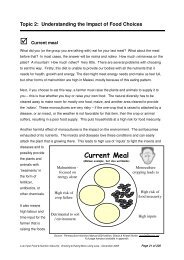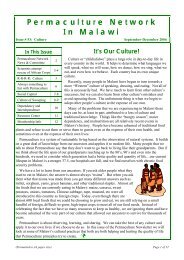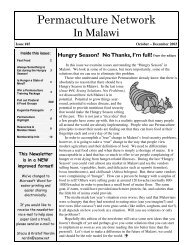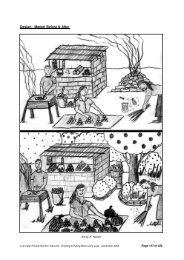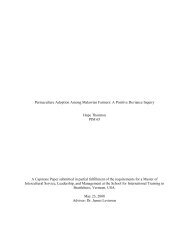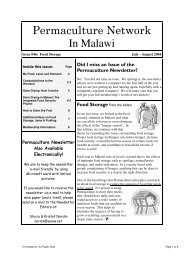Harmonisation of seed laws in Africa.indd - Never Ending Food
Harmonisation of seed laws in Africa.indd - Never Ending Food
Harmonisation of seed laws in Africa.indd - Never Ending Food
You also want an ePaper? Increase the reach of your titles
YUMPU automatically turns print PDFs into web optimized ePapers that Google loves.
GRICULTURE, ENERGY AND LIVELIHOOD SERIES<br />
protected varieties. The use and exchange <strong>of</strong> farm saved <strong>seed</strong> is a practise that underp<strong>in</strong>s<br />
agricultural systems <strong>in</strong> most develop<strong>in</strong>g countries; and <strong>in</strong> <strong>Africa</strong> <strong>in</strong> particular. Even rural trade is not<br />
allowed based on the further use and exchange <strong>of</strong> protected varieties. Further, even the limited<br />
exception provision <strong>in</strong> UPOV 1991 is subject to the safeguard<strong>in</strong>g <strong>of</strong> the legitimate <strong>in</strong>terests <strong>of</strong> the<br />
breeder – i.e. subject to payment <strong>of</strong> a royalty to the breeder!<br />
The World Intellectual Property Oganisation (WIPO)<br />
WIPO is a specialised agency <strong>of</strong> the United Nations tasked with the protection and<br />
promotion <strong>of</strong> <strong>in</strong>tellectual property throughout the world. It operates at many levels, giv<strong>in</strong>g<br />
adm<strong>in</strong>istrative and technical assistance on IP not only to governments but also to other<br />
agencies with<strong>in</strong> the UN. It also provides legal and technical assistance to implement the<br />
World Trade Organisation’s Trade Related Intellectual Property Rights (TRIPS) agreement.<br />
WIPO’s promotional role <strong>in</strong> the implementation <strong>of</strong> IP <strong>in</strong> develop<strong>in</strong>g countries has had a<br />
pr<strong>of</strong>ound and – up to now – underestimated impact on biodiversity, food security and<br />
access to medic<strong>in</strong>e. WIPO has been heavily criticised for its narrow focus on promot<strong>in</strong>g and<br />
expand<strong>in</strong>g IP, <strong>of</strong>ten disregard<strong>in</strong>g the crucial development-oriented elements <strong>of</strong> its mission<br />
statements. 34 This has raised questions about whose <strong>in</strong>terests it represents. Although WIPO<br />
is legally separate from UPOV, the two agencies are close, shar<strong>in</strong>g a build<strong>in</strong>g <strong>in</strong> Geneva<br />
and WIPO’s Director General is also the Secretary General <strong>of</strong> UPOV. The 1982 WIPO/UPOV<br />
Agreement sets out the reciprocal relationship between the two agencies. 35<br />
As part <strong>of</strong> their food security and development agenda, WIPO hosts workshops and tra<strong>in</strong><strong>in</strong>g<br />
on IP <strong>in</strong> <strong>Africa</strong> on the pretext that PVP supports food security strategies on the cont<strong>in</strong>ent.<br />
The Protection <strong>of</strong> Farmers’ Rights<br />
and Alternatives to UPOV<br />
The Seed Treaty<br />
The International Treaty on Plant Genetic Resources for <strong>Food</strong> and Agriculture (also known as the<br />
Seed Treaty) came <strong>in</strong>to effect <strong>in</strong> June 2004. To date, 127 countries have ratified the Treaty, <strong>in</strong>clud<strong>in</strong>g<br />
many <strong>Africa</strong>n countries. 36 Article 9.1 <strong>of</strong> the Treaty recognises the contribution <strong>of</strong> local and <strong>in</strong>digenous<br />
farmers to the conservation and development <strong>of</strong> plant genetic resources globally, but then <strong>in</strong> Article<br />
9.2 leaves the responsibility for the realisation <strong>of</strong> those rights with national governments, subject<br />
to their own priorities and national legislation. Article 9(2)(c) recognises the rights <strong>of</strong> the local and<br />
<strong>in</strong>digenous communities and farmers ‘to participate <strong>in</strong> mak<strong>in</strong>g decisions at the national level on<br />
matters related to the conservation and susta<strong>in</strong>able use <strong>of</strong> plant genetic resources for food and<br />
agriculture.’<br />
The elements <strong>of</strong> Farmers’ Rights <strong>in</strong> the Seed Treaty thus <strong>in</strong>clude the:<br />
a.) Protection <strong>of</strong> traditional knowledge relevant to plant genetic resources for food and agriculture;<br />
b.) Right to equitably participate <strong>in</strong> shar<strong>in</strong>g benefits aris<strong>in</strong>g from the utilisation <strong>of</strong> plant genetic<br />
resources for food and agriculture;<br />
<strong>Harmonisation</strong> <strong>of</strong> <strong>Africa</strong>’s <strong>seed</strong>s <strong>laws</strong>: a recipe for disaster 17



